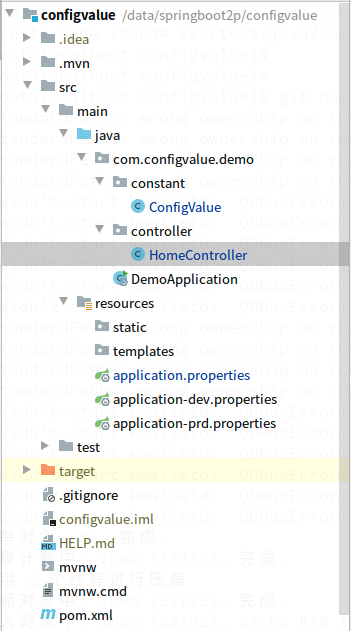一,从配置文件中读取数据有哪些方法?
通常有3种用法:
1,直接使用value注解引用得到配置项的值
2, 封装到Component类中再调用
3, 用Environment类从代码中直接访问
生产环境中推荐使用第二种,用一个统一的文件来加载,
而不必写死到代码中,如果配置有变更时可以统一修改也更方便
说明:刘宏缔的架构森林是一个专注架构的博客,地址:https://www.cnblogs.com/architectforest
对应的源码可以访问这里获取: https://github.com/liuhongdi/
说明:作者:刘宏缔 邮箱: 371125307@qq.com
二,演示项目的相关信息
1,项目地址:
https://github.com/liuhongdi/configvalue
2,功能说明:
演示了从配置文件读取数据的方法
3,项目结构:如图:

三,配置文件说明
1,pom.xml
<dependency> <groupId>org.springframework.boot</groupId> <artifactId>spring-boot-starter-web</artifactId> </dependency>
2,application.properties
#error server.error.include-stacktrace=always #errorlog logging.level.org.springframework.web=trace #profile spring.profiles.active=prd
3,application-dev.properties
#images app.goods.imagesUrlHost = http://127.0.0.1:81/goods app.goods.imagesOrigDir = /data/file/html/goods/images app.goods.imagesTmbDir = /data/file/html/goods/tmb
4,application-prd.properties
#images app.goods.imagesUrlHost = http://file.lhdtest.com/goods app.goods.imagesOrigDir = /data/estore/file/html/goods/images app.goods.imagesTmbDir = /data/estore/file/html/goods/tmb
四,java代码说明:
1,ConfigValue.java
/* * 从配置文件中读取的变量 * lhd * 2020.10.15 * */ @Component public class ConfigValue { //imagesUrlHost @Value("${app.goods.imagesUrlHost}") public String imagesUrlHost; //imagesOrigDir @Value("${app.goods.imagesOrigDir}") public String imagesOrigDir; //imagesTmbDir @Value("${app.goods.imagesTmbDir}") public String imagesTmbDir; }
用途:统一加载配置文件中的配置项
2,HomeController.java
@Controller @RequestMapping("/home") public class HomeController { @Resource private ConfigValue configValue; @Resource private Environment environment; //从配置文件读取变量imagesUrlHost @Value("${app.goods.imagesUrlHost}") private String imagesUrlHost; //三种方式打印从配置文件中读取到的变量值 @GetMapping("/home") @ResponseBody public String home() { String res = "第一种方法:直接用value引用:"+imagesUrlHost+":<br/>"; res += "第二种方法:封装到Component类中:"+configValue.imagesUrlHost+":<br/>"; res += "第三种方法:environment:"+environment.getProperty("app.goods.imagesUrlHost")+":<br/>"; return res; } }
三种方法都可以使用,但Component类耦合度更低,使用时也更方便
五,测试效果
1,访问:
http://127.0.0.1:8080/home/home
返回:
第一种方法:直接用value引用:http://file.lhdtest.com/goods: 第二种方法:封装到Component类中:http://file.lhdtest.com/goods: 第三种方法:environment:http://file.lhdtest.com/goods:
2,切换profile为dev,可以看到访问的返回数据发生了变化
六,查看spring boot的版本:
. ____ _ __ _ _ /\ / ___'_ __ _ _(_)_ __ __ _ ( ( )\___ | '_ | '_| | '_ / _` | \/ ___)| |_)| | | | | || (_| | ) ) ) ) ' |____| .__|_| |_|_| |_\__, | / / / / =========|_|==============|___/=/_/_/_/ :: Spring Boot :: (v2.3.4.RELEASE)